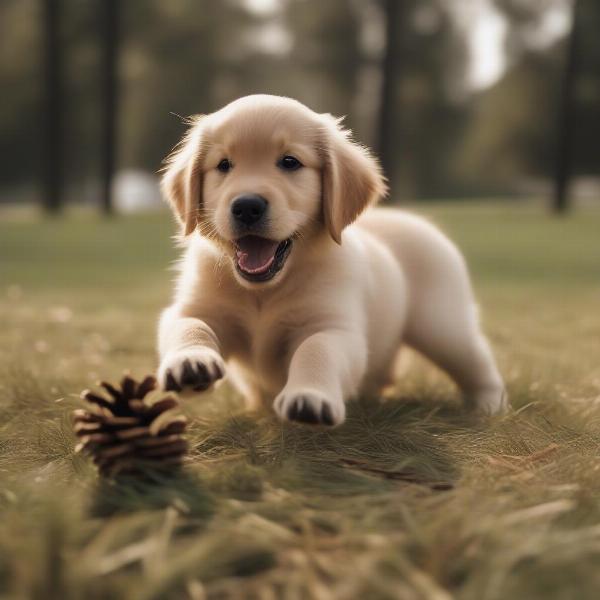Pine cones. Those seemingly innocuous woody wonders of nature hold an inexplicable allure for many dogs. From playful pounces to determined chewing, the canine fascination with pine cones can be puzzling for owners. But why is my dog obsessed with pine cones? This article delves into the reasons behind this common canine quirk, exploring everything from natural instincts to potential health concerns.
Understanding your dog’s obsession with pine cones starts with recognizing their inherent curiosity and playful nature. Dogs explore the world through their senses, particularly smell and touch. Pine cones, with their unique texture and earthy scent, provide a stimulating sensory experience. Their irregular shape and size make them ideal for chasing, fetching, and chewing, satisfying a dog’s natural prey drive. For some dogs, the simple act of gnawing on a pine cone can be a self-soothing activity, much like a child with a favorite blanket. However, it’s essential to distinguish between harmless play and potentially problematic behavior.
Is It Normal for Dogs to Be Obsessed with Pine Cones?
While a mild interest in pine cones is generally harmless, an excessive obsession can indicate underlying issues. Some dogs might be experiencing boredom or lack of mental stimulation, leading them to fixate on pine cones as a form of entertainment. Others could be teething puppies finding relief in the pine cone’s texture, or older dogs seeking comfort due to dental discomfort. It’s crucial to observe your dog’s behavior and consult with a veterinarian if the obsession seems excessive or accompanied by other behavioral changes.
 Dog playing with a pine cone
Dog playing with a pine cone
Potential Dangers of Pine Cones for Dogs
While pine cones might seem like a natural and harmless toy, they pose several potential risks to your canine companion. Small pine cones can be swallowed, leading to choking hazards or intestinal blockages. Larger cones can splinter, causing mouth injuries or gastrointestinal irritation if ingested. The sticky resin on pine cones can also irritate a dog’s skin and coat, and some pine cones are treated with pesticides, posing further toxicity risks. Therefore, it’s essential to monitor your dog’s interaction with pine cones and take preventative measures to ensure their safety.
How Can I Stop My Dog from Eating Pine Cones?
Preventing your dog from eating pine cones requires a multi-pronged approach. Regularly clean up your yard to minimize access to pine cones. Provide alternative, safe chew toys to redirect your dog’s attention and satisfy their chewing instincts. Train your dog to “leave it” or “drop it” when they pick up a pine cone. Positive reinforcement, such as praise and treats, can be highly effective in discouraging pine cone chewing.
What Should I Do If My Dog Eats a Pine Cone?
If your dog ingests a pine cone, contact your veterinarian immediately. Depending on the size of the cone and your dog’s symptoms, your veterinarian might recommend inducing vomiting or monitoring your dog for signs of blockage or distress. Early intervention is crucial in preventing serious complications.
What are the signs of pine cone ingestion?
Signs of pine cone ingestion can include vomiting, loss of appetite, lethargy, abdominal pain, and changes in bowel movements. If you notice any of these symptoms, seek veterinary attention immediately.
Can pine cones cause poisoning in dogs?
While not all pine cones are poisonous, some are treated with pesticides that can be toxic to dogs. Additionally, the resin on pine cones can cause irritation and gastrointestinal upset.
Conclusion
While a dog’s fascination with pine cones might stem from natural instincts, it’s crucial to understand the potential risks involved. By being proactive and taking appropriate preventative measures, you can ensure your furry friend’s safety and redirect their playful energy towards safer and more enriching activities. Don’t let a pine cone obsession turn into a health hazard – prioritize your dog’s well-being and enjoy their playful nature responsibly.
FAQ
- Why does my dog love pine cones so much? Dogs are often drawn to the unique texture, scent, and shape of pine cones, which can stimulate their senses and satisfy their natural chewing instincts.
- Are pine cones dangerous for dogs? Yes, pine cones can pose choking hazards, cause intestinal blockages, and lead to mouth injuries or gastrointestinal irritation due to splinters and resin.
- How can I prevent my dog from eating pine cones? Regularly clean up your yard, provide alternative chew toys, and train your dog to “leave it” or “drop it.”
- What should I do if my dog eats a pine cone? Contact your veterinarian immediately for advice and potential treatment.
- Can all pine cones harm dogs? While most pose physical risks, some are treated with pesticides which can be toxic.
ILM Dog is your trusted resource for expert advice on all aspects of dog care, from breed selection and health to training and nutrition. We’re dedicated to providing practical and reliable information to help you raise a happy and healthy canine companion. For more insightful articles and expert tips, visit ILM Dog. Contact us at [email protected] or +44 20-3965-8624 for personalized guidance.